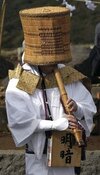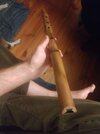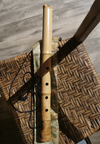A few weeks ago I decided to learn how to play the Shakuhachi (Japanese bamboo flute).. I'd been wanting to learn a new, completely different, instrument for a few years (used to play classical guitar, but have mainly written electronic/computer music).. Never played a wind instrument before and hadn't considered one until now. It's really interesting and fun!
The Shakuhachi is lovely. They're traditionally made from the root end of a specific kind of bamboo, and treated with a lacquer made from a certain kind of sap. They have 4 finger holes and 1 thumb hole, and the blowing edge is just a sharpened part of the rim. They were played by Zen Buddhist monks.. the fellows who wore baskets over their heads.

I bought a beginner's one from an Australian guy who makes them out of local Aurea bamboo. I don't know how it compares to antique Japanese ones :) But it sounds beautiful and I love it.

That Wikipedia article isn't kidding about how versatile these flutes are! The range of notes and timbres you can make seems amazing for something with only 5 holes.. I love its classic "breathy" sound, but you can play cleaner, purer tones, muted sounding tones almost like a clarinet or oboe or something.. even didgeridoo-esque vocal flourishes, and strange warbling sounds and overtones. Minute alterations in the configuration of your lips, angle of your head, exact way you're covering holes with your fingers, even the speed at which you lift or place your fingers, all changes the sound... I had no idea of any of this when I started.. It's going to be a long quest to become a Shakuhachi master. =) Took me 2 weeks (of trying a few minutes a day) to even get a sound out of it! Of course there are similar traditional flutes from lots of different countries and they're probably all just as cool.
For the moment, I'm not doing any kind of proper structured learning, or trying to play any specific songs...just improvising... I watched a few youtube videos and am spending little moments throughout the day experimenting with it. I can make sound no worries, but my consistency is all over the place. Most of the time I can't play the upper octave (which is done by changing embouchure) except by accident.... but some days ALL I can play is the upper octave. Just in the last couple days I started getting very nice sounding classic openly breathy sounding notes... Some days, everything sounds horrid and squawky. I will eventually buy a book and try to follow specific techniques - I would like to try to learn some of the traditional Honkyoku pieces - I really like how they're more like sound paintings than songs - but at the moment I'm concentrating on my posture, finger and lip positions, and BREATHING (I need to do EE). It's profoundly relaxing and satisfying. Wish I had somewhere to play where I wouldn't bother people... maybe somewhere with a nice natural reverb.. I tend to inadvertently play an overly-muted sound, maybe because I try to play quietly...
BTW I don't particularly know anything about Zen Buddhism (though the Tao Te Ching made perfect sense to me when I read it, it was the first religious type thing I read that thought the same way I did), for me this is mainly about sound. Any meditative benefits are a lovely bonus.
I arrived at the Shakuhachi in a silly roundabout way... Its simplicity, the mindfulness required to play it, and the fact that it's all about breath, are what attracted me to it... But the way it jumped out at me was, I was reading some science fiction novels - David Zindell's 'Neverness' series - in which a main character plays Shakuhachi and carries it with him everywhere.. I liked how the books described the character's love for the instrument, and how the music he made with it was like elemental nature. When I looked up what this instrument was, I realised I'd heard it before, a LOT....... because there's a famous sound sample of a Shakuhachi which was part of a sound library, and was used in HEAPS of music, particularly 1990's jungle/drum'n'bass which I was into in my misspent youth. Ohhh, it's THAT flute sound! I even used to use that sample in my own electronic tracks as a teenager, it was one of my favourite sounds to use...
Here are a few Shakuhachi pieces I like..
Here's a cover of Jimi Hendrix's Hey Joe: Hey Joe, by Cornelius Boots - Bass Shakuhachi, Nature Blues 尺八
And this other guy I found on Bandcamp, I think he's not as good a player as the previous ones (who are all proper grand masters!), but I like his improvisational style.. this piece is all slidey and bendy: Present in Transformations, by Shakuhachi Spirit
And, OK well, here are a couple little recordings of me playing... just random noodling... I'm an absolute beginner. I added a lot of reverb because it makes me sound better than I am. I also overlaid recordings of the creek near my house, because it sounds nice. Not brave enough to actually play down by the creek yet :D The 3rd file is just Shakuhachi without reverb, so you can hear what it really sounds like.. These were recorded on a little old Minidisc condenser microphone, nothing fancy... I figured out it sounds nicest if I place the mic next to my mouth, but don't have a mic stand so had to hunch over awkwardly instead of sitting/standing tall...
View attachment shakuhachi-cave.mp3
View attachment shakuhachi-cave-2.mp3
View attachment shaku-raw.mp3
Thanks for reading / listening! If anyone else plays Shakuhachi or something similar, you are most welcome to post about your adventures here too..
The Shakuhachi is lovely. They're traditionally made from the root end of a specific kind of bamboo, and treated with a lacquer made from a certain kind of sap. They have 4 finger holes and 1 thumb hole, and the blowing edge is just a sharpened part of the rim. They were played by Zen Buddhist monks.. the fellows who wore baskets over their heads.

The bamboo end-blown flute now known as the shakuhachi was developed in Japan in the 16th century and is called the fuke shakuhachi (普化尺八). [...] It was used by the monks of the Fuke Zen of Zen Buddhism in the practice of suizen (blowing meditation).
The instrument is tuned to the minor pentatonic scale.
The name shakuhachi means "1.8 shaku", referring to its size. It is a compound of two words:
Thus, the compound word shaku-hachi means "one shaku eight sun" (54.54 cm (21.47 in)), the standard length of a shakuhachi. Other shakuhachi vary in length from about 1.3 shaku up to 3.6 shaku. Although the sizes differ, all are still referred to generically as shakuhachi.
- shaku (尺) is an archaic unit of length equal to 30.3 centimetres (0.99 ft)) and subdivided in ten subunits.
- hachi (八) means "eight", here eight sun, or tenths, of a shaku.
Shakuhachi are usually made from the root end of madake (Phyllostachys bambusoides) bamboo culm and are extremely versatile instruments. Professional players can produce virtually any pitch they wish from the instrument, and play a wide repertoire of original Zen music, ensemble music with koto, biwa, and shamisen, folk music, jazz, and other modern pieces.
Much of the shakuhachi's subtlety (and player's skill) lies in its rich tone colouring, and the ability for its variation. Different fingerings, embouchures and amounts of meri/kari can produce notes of the same pitch, but with subtle or dramatic differences in the tone colouring. Holes can be covered partially and pitch varied subtly or substantially by changing the blowing angle. The Honkyoku pieces rely heavily on this aspect of the instrument to enhance their subtlety and depth.
I bought a beginner's one from an Australian guy who makes them out of local Aurea bamboo. I don't know how it compares to antique Japanese ones :) But it sounds beautiful and I love it.

That Wikipedia article isn't kidding about how versatile these flutes are! The range of notes and timbres you can make seems amazing for something with only 5 holes.. I love its classic "breathy" sound, but you can play cleaner, purer tones, muted sounding tones almost like a clarinet or oboe or something.. even didgeridoo-esque vocal flourishes, and strange warbling sounds and overtones. Minute alterations in the configuration of your lips, angle of your head, exact way you're covering holes with your fingers, even the speed at which you lift or place your fingers, all changes the sound... I had no idea of any of this when I started.. It's going to be a long quest to become a Shakuhachi master. =) Took me 2 weeks (of trying a few minutes a day) to even get a sound out of it! Of course there are similar traditional flutes from lots of different countries and they're probably all just as cool.
For the moment, I'm not doing any kind of proper structured learning, or trying to play any specific songs...just improvising... I watched a few youtube videos and am spending little moments throughout the day experimenting with it. I can make sound no worries, but my consistency is all over the place. Most of the time I can't play the upper octave (which is done by changing embouchure) except by accident.... but some days ALL I can play is the upper octave. Just in the last couple days I started getting very nice sounding classic openly breathy sounding notes... Some days, everything sounds horrid and squawky. I will eventually buy a book and try to follow specific techniques - I would like to try to learn some of the traditional Honkyoku pieces - I really like how they're more like sound paintings than songs - but at the moment I'm concentrating on my posture, finger and lip positions, and BREATHING (I need to do EE). It's profoundly relaxing and satisfying. Wish I had somewhere to play where I wouldn't bother people... maybe somewhere with a nice natural reverb.. I tend to inadvertently play an overly-muted sound, maybe because I try to play quietly...
BTW I don't particularly know anything about Zen Buddhism (though the Tao Te Ching made perfect sense to me when I read it, it was the first religious type thing I read that thought the same way I did), for me this is mainly about sound. Any meditative benefits are a lovely bonus.
I arrived at the Shakuhachi in a silly roundabout way... Its simplicity, the mindfulness required to play it, and the fact that it's all about breath, are what attracted me to it... But the way it jumped out at me was, I was reading some science fiction novels - David Zindell's 'Neverness' series - in which a main character plays Shakuhachi and carries it with him everywhere.. I liked how the books described the character's love for the instrument, and how the music he made with it was like elemental nature. When I looked up what this instrument was, I realised I'd heard it before, a LOT....... because there's a famous sound sample of a Shakuhachi which was part of a sound library, and was used in HEAPS of music, particularly 1990's jungle/drum'n'bass which I was into in my misspent youth. Ohhh, it's THAT flute sound! I even used to use that sample in my own electronic tracks as a teenager, it was one of my favourite sounds to use...
Here are a few Shakuhachi pieces I like..
Here's a cover of Jimi Hendrix's Hey Joe: Hey Joe, by Cornelius Boots - Bass Shakuhachi, Nature Blues 尺八
And this other guy I found on Bandcamp, I think he's not as good a player as the previous ones (who are all proper grand masters!), but I like his improvisational style.. this piece is all slidey and bendy: Present in Transformations, by Shakuhachi Spirit
And, OK well, here are a couple little recordings of me playing... just random noodling... I'm an absolute beginner. I added a lot of reverb because it makes me sound better than I am. I also overlaid recordings of the creek near my house, because it sounds nice. Not brave enough to actually play down by the creek yet :D The 3rd file is just Shakuhachi without reverb, so you can hear what it really sounds like.. These were recorded on a little old Minidisc condenser microphone, nothing fancy... I figured out it sounds nicest if I place the mic next to my mouth, but don't have a mic stand so had to hunch over awkwardly instead of sitting/standing tall...
View attachment shakuhachi-cave.mp3
View attachment shakuhachi-cave-2.mp3
View attachment shaku-raw.mp3
Thanks for reading / listening! If anyone else plays Shakuhachi or something similar, you are most welcome to post about your adventures here too..

 thank you for sharing.
thank you for sharing.



